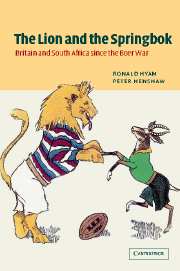Book contents
- Frontmatter
- Contents
- List of illustrations
- List of tables
- Preface
- Acknowledgements
- List of abbreviations
- 1 The uneasy special relationship: dynamics and divergencies
- 2 Breakdown: into war, 1895–1899
- 3 Post-war: the myth of magnanimity, 1905–1907
- 4 African interests and the South Africa Act, 1908–1910
- 5 ‘Greater South Africa’: the struggle for the High Commission Territories, 1910–1961
- 6 The economic dimension: South Africa and the sterling area, 1931–1961
- 7 Britain, the United Nations, and the ‘South African disputes’, 1946–1961
- 8 The political consequences of Seretse Khama and Ruth, 1948–1952
- 9 Containing Afrikanerdom: the geopolitical origins of the Central African Federation, 1948–1953
- 10 Strategy and the transfer of Simon's Town, 1948–1957
- 11 The parting of the ways: the departure of South Africa from the Commonwealth, 1951–1961
- 12 Enfeebled lion? How South Africans viewed Britain, 1945–1961
- 13 Springbok reviled: some British reactions to apartheid, 1948–1994
- Epilogue The relationship restored: the return of the new South Africa to the Commonwealth, 1994
- Select bibliography
- Index
11 - The parting of the ways: the departure of South Africa from the Commonwealth, 1951–1961
Published online by Cambridge University Press: 03 December 2009
- Frontmatter
- Contents
- List of illustrations
- List of tables
- Preface
- Acknowledgements
- List of abbreviations
- 1 The uneasy special relationship: dynamics and divergencies
- 2 Breakdown: into war, 1895–1899
- 3 Post-war: the myth of magnanimity, 1905–1907
- 4 African interests and the South Africa Act, 1908–1910
- 5 ‘Greater South Africa’: the struggle for the High Commission Territories, 1910–1961
- 6 The economic dimension: South Africa and the sterling area, 1931–1961
- 7 Britain, the United Nations, and the ‘South African disputes’, 1946–1961
- 8 The political consequences of Seretse Khama and Ruth, 1948–1952
- 9 Containing Afrikanerdom: the geopolitical origins of the Central African Federation, 1948–1953
- 10 Strategy and the transfer of Simon's Town, 1948–1957
- 11 The parting of the ways: the departure of South Africa from the Commonwealth, 1951–1961
- 12 Enfeebled lion? How South Africans viewed Britain, 1945–1961
- 13 Springbok reviled: some British reactions to apartheid, 1948–1994
- Epilogue The relationship restored: the return of the new South Africa to the Commonwealth, 1994
- Select bibliography
- Index
Summary
Since the autumn of 1950 British ministers and civil servants had contemplated the possibility that they might have to choose between their relationship with South Africa and their relationships with the rest of Africa and the world at large. It seemed increasingly obvious that British embarrassment, combined with South Africa's growing disenchantment, might at any time precipitate a ‘parting of the ways’. A Conservative government was faced with precisely that choice in March 1961 at the Commonwealth Prime Ministers' Meeting. Yet more than ten years earlier a significant hardening of attitude towards South Africa had taken place under a Labour government. The Commonwealth Relations secretary, Patrick Gordon Walker, had laid it down that containment of the Union of South Africa was a policy equally important with political advancement for Africans. James Griffiths (as secretary of state for the colonies) had declared apartheid to be ‘totally repugnant’ and, supported by Aneurin Bevan, had foreseen a time when ‘the United Kingdom might have to consider whether she lost more than she gained by her present association with the Union government’. The joint deputy under-secretary at the Colonial Office, Sir Charles Jeffries, was clear before the end of 1952 that Britain was ‘committed to the policy of a particoloured Commonwealth’, and if a choice had to be made, would side with it against South Africa. The high commissioner in South Africa, Sir Percivale Liesching (1955–8), wrote in 1957 that in the longer term the Union's continued membership of the Commonwealth was an open question.
- Type
- Chapter
- Information
- The Lion and the SpringbokBritain and South Africa since the Boer War, pp. 254 - 272Publisher: Cambridge University PressPrint publication year: 2003



